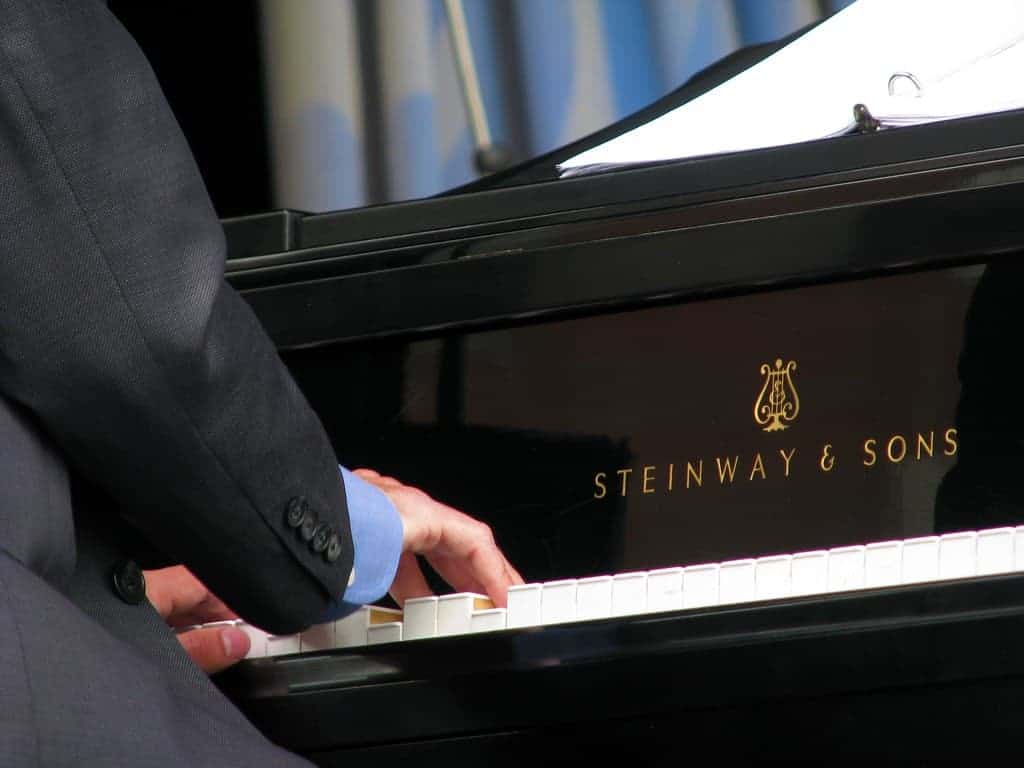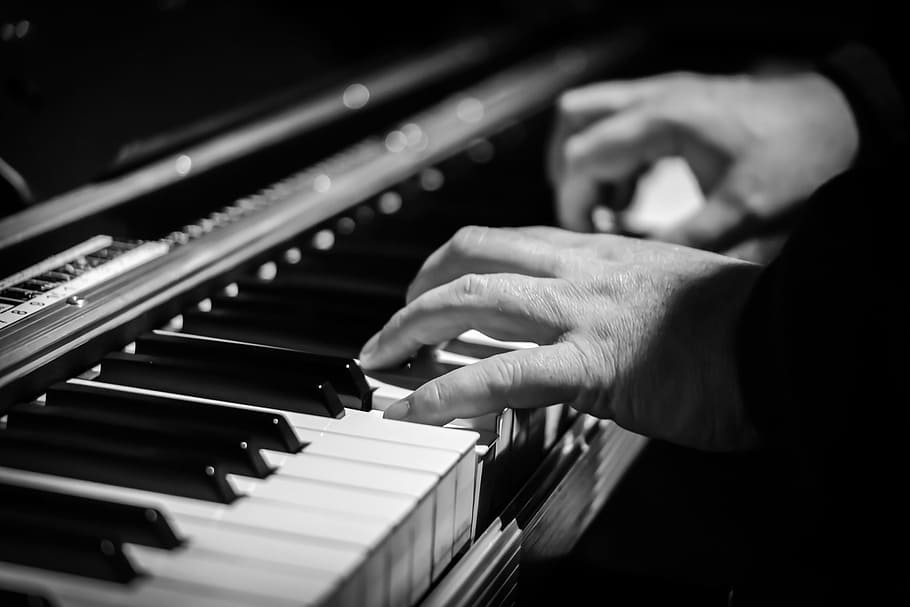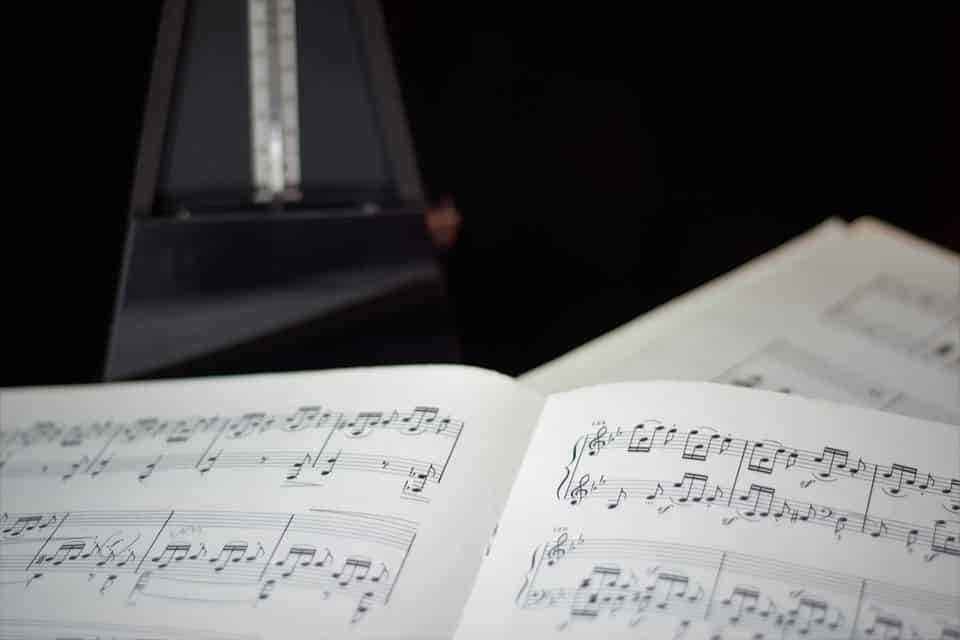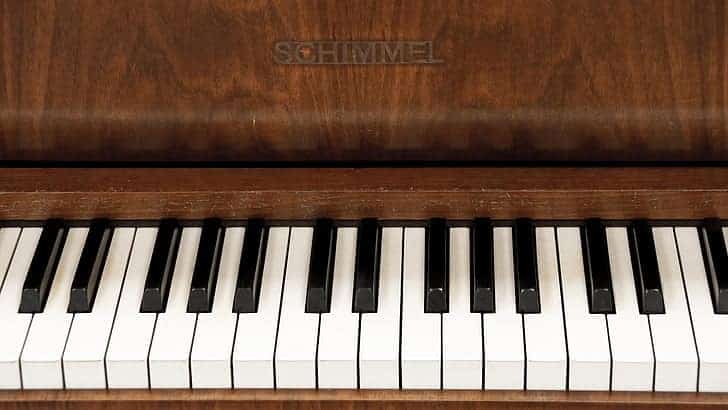“Scales.” The very word strikes fear into the hearts of piano students around the world. Why on earth would you want to practice scales, anyway? They’re so unbelievably boring and tedious that there couldn’t possibly be any benefit to practicing them. Why learn piano scales?

If this sounds familiar, then you aren’t alone. I’ll confess that I never really practiced my scales as a child. I suffered for it, and it meant that I didn’t develop as a musician nearly as quickly or as thoroughly as I could have.
Why Learn Scales?
Scales are the building blocks of all piano playing. No matter what music you play, from whichever era in whichever genre, chances are you will experience scales somewhere in the piece. The fundamentals of western classical tradition, and by extension all music that followed (jazz, pop, rock, etc) are based on scales.
A big part of the problem with pianists nowadays is that they don’t practice fundamentals of technique, such as scales and sight reading. And in some ways, I understand why; scales and sight-reading aren’t pleasant to practice if you’re not very good at them. Coupled with the fact that most students only really want to play a particular piece, people neglect their scales. Many students don’t even think about scales until they need to do an exam.

However, this is counterproductive, because scales provide you with three major benefits that will impact your playing of pieces.
- Scales train your internal metronome. So often I hear students play pieces that they love, with absolutely no sense of timing. Advanced students too, although sometimes they get clever and blame it on “rubato.” Newsflash: I know what rubato is, and adding an extra beat to every bar is not it. Scales help immensely with training your inner metronome, as you’re playing the same pattern often at different speeds. You’ll find if you start practicing your scales with a metronome, pretty soon you’ll be able to play them without one, and this will positively impact your ability to stay in time in other music.
- Scales offer wonderful ear training. So often I hear students play wrong notes, and when I ask them whether they can identify where they played a wrong note, they can’t. Their ears aren’t accustomed to the tonality and the key in which they’re playing. However, if they’d practiced scales in that key, they’d instantly be able to identify a wrong note and would be able to take steps in their practice to correct it.
- Lastly, and most importantly, the scale pattern is the most common pattern in music. Think of scales almost like a “cheat sheet;” a chance to practice and perfect bits of pieces you haven’t even thought of playing yet.
Why Fingerings Are So Important
Now, we come onto another contentious subject. Again, I get this from my own students. “Surely as long as I play the notes, the fingering doesn’t matter?”
Not so.
Let me explain why. Firstly, fingerings have been worked out in scale books for decades for a reason. They work, and they’re the most efficient way of playing a scale. Granted, everyone’s hand is different, but by and large, scale fingerings are uniform for everyone. Following the given fingering just makes things much, much easier for yourself. If you master the technique, these fingerings are designed to help you play your scales as fast and as smoothly as possible without tripping over your own fingers.

The given fingerings also train your dexterity, and help with smoothness in transition points, for example when you have to pass the thumb under the hand, or pass the third or fourth finger over.
However, the main reason why the given fingerings are useful to learn is that once you have them solidified, you will automatically use them in scale passages in other pieces. Imagine if you were playing a Mozart sonata, and you had to work out every single scale passage as you came across it. It would take you forever. Had you already practiced your fingering, you’d automatically know which fingers to put on which notes.
This also helps during sight-reading; you have less to worry about. There’s no need to busy yourself with worrying about your fingering; you simply concentrate on finding the right notes.
As I’ve said, the usual given fingerings for scale passages are pretty comfortable for 99% of players, and there shouldn’t really be any reason to change them. If for whatever reason, however, you can’t do what your teacher is telling you or what’s written down in your scale book, figure out your own fingering, but make sure you stick to it. Having a consistent fingering across your scale patterns is more important than the semantics of exactly which finger goes where.
How to Practice Scales
The great thing about scales is that they are exceptionally versatile. For every scale, there’s a million ways to practice it and modify it so that you can extract even more technical benefit out of it.
For example, start with your basic C major scale. Even if you don’t change any of the notes, here’s a few things you could do with it.
- Change the rhythm.
- Change the articulation.
- Accent different notes; every three, every four, every six, every eight.
- Play more than one octave.
- Play contrary motion (left hand going down, right hand going up or vice versa.)
However, for those just getting started, or maybe haven’t had experience practicing scales too much, here’s a few tips that you can follow to achieve scale mastery.
Get the fingerings right
I know we’ve spoken about this already, but it’s crucial. Work out a fingering, and stick with it. Again, I highly recommend going with standard scale fingerings as featured in your scale books. You’ll pick them up fairly quickly and they’re almost certain to be better than what you’ve come up with yourself.
Go through every key, every scale, and learn which fingers to put where. This is more important than anything else.
Play slowly
We’ve all been dazzled by those who can play scale passages so quickly their hands just seem to fly across the keyboard. However, nobody who can do this was born able to do it. They had to practice, just like you and I. They practiced slowly and methodically, too. You won’t ever be able to play quickly if you don’t practice the fundamentals as slowly and as carefully as you dare.
This advice stands for any music. When you play slowly, you can identify mistakes and errors in technique much more easily, and you’re less likely to brush over them as you would when playing quickly. Look up my concept of deliberate practice in an article I wrote about practicing the piano efficiently. You’ll be surprised at how quickly you develop your piano-playing skills if you follow my advice.
Use a metronome
This is related to the previous point, but you need to use a metronome when you start practicing scales because it will train your internal ability to keep time. There’s no room for rubato in scales; they’re a technical exercise and should be treated as such. That means you should play them exactly in time, every time, unless you’re playing them as part of a piece.

Set the metronome to a slow speed, and run through one scale. When you’re happy that the cross-overs are smooth, there’s no unevenness and the fingerings are solid, you can bump up the tempo a few beats and try again. Keep doing this until you can reach your desired tempo. This is how you learn how to play scales super-fast.
How Long Should You Practice Piano Scales?
There’s no one general rule that applies to everyone. I encourage my students to dedicate about 25% of their practice time to scales and arpeggios, as well as other technical work. For example if a student practices an hour a day, I’d expect them to spend 15 minutes on their scales.
This isn’t a lot, but it’s predicated on them being proficient with their scales, able to play them at a decent enough tempo and not needing to spend time learning new scales. If you’re a beginner to practicing your scales, you’ll need to spend a bit longer practicing them; maybe around 40% or 50% of your daily practice regime. Get comfortable with playing scales and then drop it down to 25%. Your other practice will go much smoother and more quickly as you’ll have the technical facility to play almost anything when you can play your scales.
By the way - if you're a beginner working through a beginner book, you will also want to supplement your exercises and pieces with scales on a regular basis, as these books often don't emphasise the importance of good scale-playing.

I truly believe scales are much more beneficial to your technique than anything else. You can plough through Chopin and Liszt etudes all you like, but if you haven’t got the basics down in the form of a flawless scale technique, they won’t help you. Learn to play your scales!
What Else Should I Be Practicing to Improve My Piano Technique?
Your scales are a key part of a foundational piano technique, but they’re certainly not the only part. You should also be practicing your arpeggios and broken chords, as well as your sight reading. If there’s one thing I wish I’d done more of when I was at university and practicing the piano regularly, it’s sight reading. Scales and arpeggios will help sight-reading technique hugely, but it’s also something you need to practice on its own.
The easiest way to do this is to buy a book of songs. It doesn’t matter what it is; Strauss or Schubert Lieder, a Schumann or Brahms song cycle; anything. However, I’d stay away from pop music as this tends to be too simplistic and you’ll probably become bored after a while. Open the book, and just play through it. Don’t worry about wrong notes; they simply don’t matter. The key things are rhythm and continuity. Do not stop playing, even if you get lost; make something up. This is most student’s biggest issue with sight reading; they stop even if they make one minor mistake.
Think about it. If you’re playing with a singer to a room of 1000 people, what do you think the singer or the audience cares about more; one silly little wrong note, or the fact that you stopped the music to start over again? The singer will never want to work with you again.
If you’re a proficient sight reader, and you know your scales and arpeggios well, look at practicing some studies as part of your technical routine. Czerny is a good place to start, as well as some of the Bach inventions and sinfonias. Over time you can move onto Chopin studies and Bach Preludes and Fugues. Experiment with the music you like; just remember to keep practicing those scales!

Great advice. I am a beginner with 15 months experience and I practice scales every day but will add a metronome as I struggle with rhythm particularly when playing pieces. I will also site read every day from now on.
Great to hear, Andrew; thanks for reading. Good luck with your practicing!
I have been playing for a year and a half. Now, on my second scale book. Slogging through it. Learning all 12 scales, in multiple octaves is brutal! Then minor scales. This is going to take a long time, isn’t it?! Got any motivational ideas?
Learn each Major scale along with its relative minor scale. Work on them in pairs! Same key signature, same notes, they just start and stop on a different note. Each Major scale’s relative minor is always down a minor 3rd. So for C Major, the relative minor is A minor. Also, practice both the Natural minor scale and then the harmonic minor scale. For harmonic minor you just raise the 7th scale degree. In the case of A minor, this would be a G#. Work on one set (C Major and both natural and harmonic forms of A minor) for a week or two then move on to G Major and its relative minor of E. Then on to D Major, then on to A Major, then on to E Major. It is handy to have a printed copy of the circle of 5ths with the relative minors printed on it as well. For my students, once we get to E, I go back to the top and then go counter clockwise to F, then to Bb, then to Eb, then Ab. I finish up with Db, F#, and B last. Also, always play the scale to whatever piece you are playing before you practice that piece. If you are playing a piece in the key of Eb Major, play that scale and THEN practice that piece.
Try creating a cadence at the end of the scales. This fires the imagination and gives you something fun to do at the end of the scales. Helps you learn harmonic theory as well.
Thank you for your article. It is always helpful to go back to basics and the scales are the tips of the roots.
Keep advising.
Having command of scales and arpeggios and chords/inversions will allow mastery of the instrument that goes beyond the level you’re on. Also, it’s not just intellectual preparation but also muscular development, similar to why professional athletes continue to practice regularly to maintain their abilities.
This is great. Thank you so much for posting this. I needed it. Going to pick up a scale book immediately. I have been looking for a good resource for arpeggio practice. Can you please suggest a book/resource?
I started piano aged 68, I do my scales and enjoy them as I now recognise that they do come up in pieces as you progress so stick with it.
Thanks for the great article, and I agree with absolutely everything you say. I learned my scales when I was young. I didn’t completely understand them, but I had my Oscar Beringer Scale Book (which I still have to this day) and I just read and practised them daily from there. My first teacher taught me to read very well, the scales enhanced that skill along with numerous other benefits. As a result of this I developed a “running” technique all over the keyboard very quickly. I have been teaching for many years, and I have worked out easy and fun methods to learn the scales quickly and to understand them – majors, minors, all the broken chords and arpeggios. I generally manage to get my students to change their views and opinions on scales, and whether they are for exams, or just part of the learning process, everyone does them and I ask them regularly in the lessons. Scales are an integral part of any pianist’s technique and should never be neglected. However, I have found once you change the mindset and approach to learning them, the new attitude puts one on the road to a good technique. They should never be feared!
I am self-taught so I began to play by ear but now that I progressed to an intermediate level mostly the genre of jazz I see the importance of the scales
Best advice ever and good review for this piano teacher!
“Music makes Humankind”
I already known myself about the importance of the Scales Practice.
No one intimated the importance of scales like this.
So many teachers aren’t given the importance of the Scales Practice.
Thank you so much for your importance information reg scale practice.
Kindly continue such information.
Thanks lot!
Trinity School of Music
Beethoven was a stickler for practicing scales. And he was as respected for his piano playing as he was for his composing. Carl Czerny was a student of Beethoven. Considering the influence of Beethoven on the world of classical music, it is reason enough to regard the practicing of scales as important.
I know people complain about scales, but I am having a blast with them. Learning the one octave scales, even hands together, went pretty quickly–maybe a week for all of them. I thought maybe the 2 and 3 octaves weren’t just extra hard for me, but I’m glad to see that other people struggle with them, too. I can learn about one a day so far, and it makes me feel so capable! I love seeing the progress, and it feels even more rewarding than learning a song. Plus, I’ve noticed that you can play around with the scale and going back and forth, and I swear I’ve noticed posts of popular songs and tunes throughout. I love jazz and want to focus on jazz piano, and I know a big part of that is moving around the scales and basing improv around that. Sight reading and scales might be done if the toughest things, but they also seem to be the most rewarding in showing progress and in applications.
What book would you recommend to buy as a 1st book on learning g and reviewing scales?